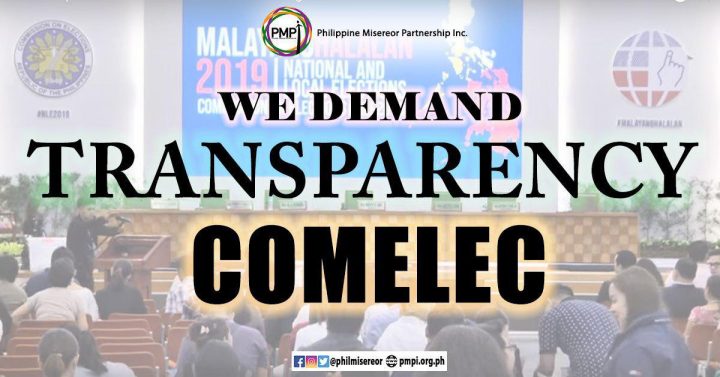(Note: Last May 13, 2019, midterm elections were held in the Philippines, with those elected taking office on June 30, 2019, halfway through the term of President Rodrigo Duterte. The following positions were contested: 12 seats in the Senate of the Philippines, all seats in the House of Representatives of the Philippines, all provincial-level elected positions in the provinces of the Philippines, all city-level elected positions in the cities of the Philippines, and, all municipal-level elected positions in the municipalities of the Philippines. What follows is the press statement of PMPI on the conduct of the recently-concluded elections)
The 2019 midterm election is over. Elections should have been the chance of a people to shape their own destiny. Yet, our experience of elections, regarded as the most massive platform for public participation in governance, has sadly always been missing its point of target.
The just concluded election is no different. The traditional politicians, many of whom have graft and corruption cases, those with most money for campaign “tokens” or bribes and those with the most popularity and exposure “won”.
Cheating, fraud and vote-buying abound. No less than the President consider vote-buying “normal”. The vote-buying and glitches on the vote counting machines (VCM) are substantiated by reports coming from our partners in communities who tried to question the irregularities but were not able pursue it for fear for their life and security and distrust from the system.
Three reports have it that they voted for their chosen candidates but receipts included the name of Bong Go which was not part of their choice. Another voted 10 candidates however, the receipt yielded only eight names while the 9th and 10th are just dots. Another received a shaded ballot already. These are just few of the reports which manifest irregularities.
We, from the Philippine Misereor Partnership, Inc. (PMPI), a network of civil society organizations, rights groups, peace and faith-based institutions joins other civil society and church groups to demand accountability and transparency from the Commission on Election (Comelec).
The people have the right to know and be clarified:
- Why was there a lull of 7 to 9 hours in the transmission of results to the transparency server, media and watchdog groups?
- Why is there a sizable increase in glitches in the VCM and SD cards this year compared to previous elections?
- Why is the central server and “meet me room” set-up of Comelec kept secret?
- Why were the depository of receipts of the casted ballots unsealed and in carton or plastic boxes only?
- Why is there lack of information on the voting process and there was no instruction during precinct voting on the manner of voting which lead to over-voting and inability of many to vote party list groups?
Weeks before the election we are mulling over these questions:
- Why did the Comelec refuse to allow NAMFREL to have an open access to the data and information in real time of the transmission of results?
- Why did the Comelec declared Nacionalista Party (NP), a known ally of the majority party as the dominant minority opposition?
In the spirit of transparency and accountability, these questions need be answered by the Comelec as these paint seeming conspiracy by the Comelec to rig the election.
The inability of the Comelec to explain what caused the sudden stoppage of transmission during the actual lull is unacceptable. There was no clear and thorough explanation on the so called “java error” provided during the lull. And when it finally resumed, 90% of votes have been counted! Likewise, keeping secret the central server and “meet me room” is a violation of the Omnibus Election Code.
The 1,699 voting counting machines (VCM) challenged by technical glitches, out of 85,000 VCMs, and almost a thousand SD cards malfunctioned compared to 188 only in the 2016 election reek of inefficiency and unpreparedness. Even a newbie technical person would know that a huge data flooding the transmission and server needs a backup system.
Furthermore, the ruling of Comelec declaring the Nacionalista Party (NP), four days before the Election Day, as the dominant minority party is puzzling. This is crucial because under the Omnibus Election Code, the dominant minority party, which was previously the Liberal Party, is guaranteed to receive copies of the election returns and certificates of canvass to ensure fairness and transparency. Is this a move to prevent the opposition from counter checking the result of the election?
PMPI demands an explanation from Comelec. We push for the creation of an independent body to investigate the accountability of Comelec in this seeming conspiracy and fraud and its sheer inefficiency and irresponsibility.
We will not rest until a proper investigation of these allegations of a fraudulent election and conspiracy is initiated. We will help document cases of election related fraud and irregularities. We will remain vigilant. We will continue to be watchdogs and hold accountable the culprits. We call on the people to come forward and report cases and experiences of election related anomalies.






